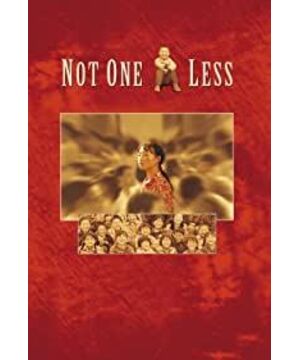——Analysis of the film "No One Can Be Missed" "No One Can Be Missed" This film was directed by Zhang Yimou. It tells the story of a 13-year-old female teacher who was alone in order to find a student who went to the city to work to improve her family's life. A story that travels to the city to find people and attract social attention. The film reflects the real predicament of rural education at that time and reflects the real style of the countryside. The final ending of the film is what the director hopes to see in the real world. The teacher did not pay attention, and the students did not accept it. The director used the front and back shots in the communication between Teacher Wei and the students many times. When the camera cuts to the students, there is no teacher Wei. At this time, Teacher Wei did not really become a teacher, and the students did not agree with this 13-year-old teacher. There was a high wall between them and they could not become real teachers and students. The director also used the front and back shots to reflect the relationship between Mr. Wei and the students. When Zhang Huike gave up his studies, Mr. Wei finally became a real teacher, and the classmates also recognized the 13-year-old boy. teacher. People come and go, and the vehicles flow incessantly. When Teacher Wei entered the city to look for someone, the director used a fixed camera many times. Teacher Wei stood alone. People and vehicles passed by constantly around her, which made Teacher Wei out of tune with the atmosphere in the city. The fear of being alone, with no one around. The embarrassment of being a first-time teacher, and chasing after him at a loss. When Mr. Wei first arrived at this dilapidated primary school the next morning, the old teacher drove away, and Mr. Wei chased after him. The director uses a cool blue tone to present the image of a girl who is overwhelmed to the audience. The cool tone here is also the character's inner unease and at a loss. The departure of the old teacher made Mr. Wei full of confusion. The red floral shirt and the white shirt form a contrast. When Mr. Wei is in the city, it contrasts with the white shirts worn by the crowd around him, which implicitly conveys Mr. Wei's incompatibility to the audience. At the same time, it also expresses the difference between the countryside and the city, and the people in the countryside cannot quickly integrate into the city life. The red here is also Teacher Wei's inner unease and panic. She is afraid of not being able to find Zhang Huike, and also has the uneasiness of being in a strange place. Sad and moving music, a group of happy children. When the children and Mr. Wei moved 1,500 bricks together and made 15 yuan, they rushed back happily. The director played music with a unique tone to contrast with the children's happiness. The music here lays the groundwork for the fact that the next fifteen dollars is not enough for the fare. The mournful music also made the audience sympathize with a group of children of all ages. It further describes the poverty of the countryside and the difficulty of rural life. Chalk runs through the entire film from beginning to end. Chalk was an important teaching tool at the time and it was also children's desire to learn. At the same time, it is also the resonance of Mr. Wei with the students time and time again. Mr. Wei also changed from a person who didn't know how to cherish chalk to a person who cherished and cherished chalk. Until the end of the film, the relationship between teachers and students became harmonious from a single word written. Chalk is also a testament to the scarcity of rural resources. This film shows the audience the shortage of rural education and educational resources at that time. At the same time, the end of the film is also the director's wish, hoping that the village can get the attention and help of the society.
View more about Not One Less reviews








